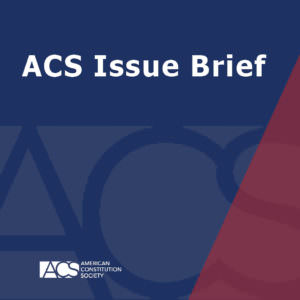The Right and Wrong Kinds of Judicial Activism
Lerner Family Associate Dean for Public Interest and Public Service Law; Professorial Lecturer in Law, George Washington University Law School

ACS is pleased to distribute "The Right and Wrong Kinds of Judicial Activism," an Issue Brief by Alan B. Morrison, Lerner Family Associate Dean for Public Interest and Public Service at The George Washington University Law School. In this Issue Brief, Professor Morrison argues that judicial activism, which he defines as judicial decision-making that overturns legislative or executive judgments, is both inevitable and necessary. The operative question, he suggests, is not whether such activism is good or bad, generally, but whether it is legitimate in specifics cases.
Tracing historical allegations of judicial activism, Professor Morrison articulates a theory for when it is justified, contending that:
"[I]t is most appropriate for the Court to intervene and overturn legislative decisions when there is some reason to believe that our system of representative government has not worked and that the protections that the Constitution is supposed to afford are lacking. The most common circumstance of appropriate intervention is to safeguard rights of a racial or other minority that were not adequately represented in the political process."
He also argues that judicial intervention is legitimate when "the structural protections afforded by the Constitution's specific guarantees of separation of powers or federalism have broken down because of an imbalance in legislative powers."
Professor Morrison then proceeds to test his theory by applying it to various decisions and areas of the law, including the landmark Brown v. Board of Education decision of the Warren Court declaring segregated schools unconstitutional; the right to privacy cases concerning abortion, contraception and anti-sodomy laws; the death penalty; and campaign finance decisions.
Read the full Issue Brief here: The Right and Wrong Kinds of Judicial Activism
